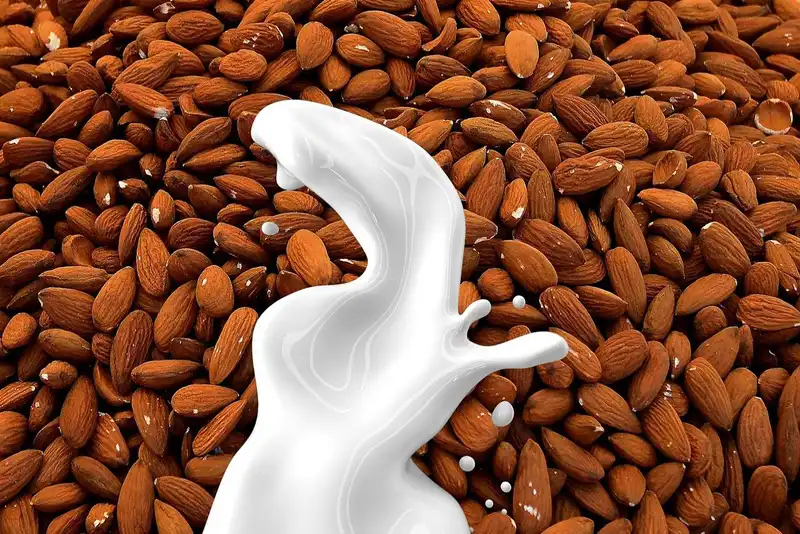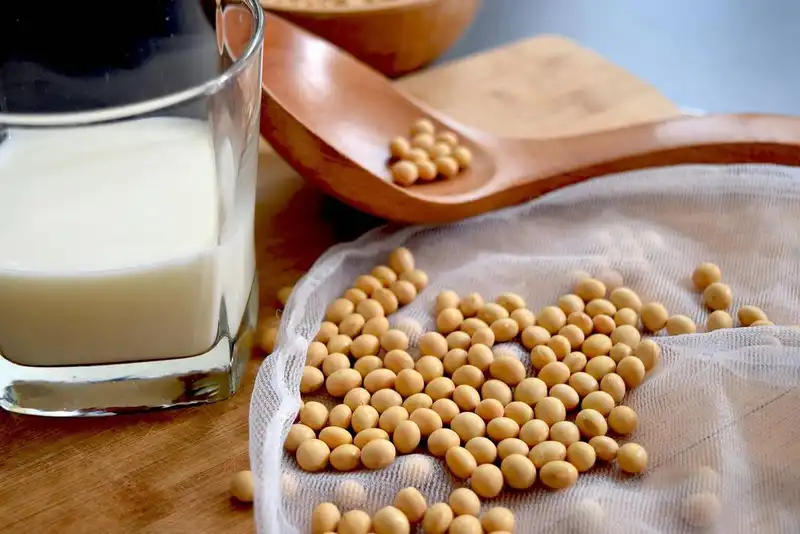What are Milk Alternatives?
There are many milk alternatives available on the market today. Some of the most popular include soymilk, almond milk, and coconut milk. These milk alternatives can be used in place of cow's milk in many recipes and are often used by those who are lactose-intolerant or have allergies to cow's milk.
Going Vegan? Try These Delicious Plant-based Milk Alternatives
Overview of the Plant-based Milk Market

Let's rewind to 2015. Vince Gilligan's and Peter Gould's 'Better Call Saul' was yet to be assessed one of the greatest television series of the 21st century. One of the lead characters, Chuck McGill (wonderfully portrayed by Michael McKean), the protagonist's sick but spiteful brother, is fascinated with soy milk. Through the show's second and third seasons, he mentions soy milk a couple of times. Enough for the audience to make a note of it. In one, he asks for a splash of soy milk in his coffee. He's "trying it out" and seems to like it.
Whether or not it was the show that helped soy milk find its place in popular culture, this milk alternative caught everyone's attention and became one of the hottest Restaurant Trends of the decade.
It wasn't that non dairy milks like soy were an invention of the new century. A wide variety of alternatives -- from coconut, to almond, and cashew milk -- have been used in traditional recipes globally for centuries. But the mid-2010s was when the market for alternative milks really started growing. It was also when most people welcomed the idea of swapping dairy milk (produced by cattle, sheep, goats) with plant based varieties in beverages, ice-creams, and so on.
Plant based or dairy free milk is one of the fastest-growing food categories in the Food Industry. Brands are capitalizing on the trend, with campaigns focusing on the additional health benefits these milks provide and touring the fact that they are environmentally friendly too.
Alternative milks, such as almond or soya, are a nutritious alternative to traditional dairy products, and they're more sustainable. According to Persistence Market Research, global demand for plant-based beverages will increase significantly in the next few years, surpassing $25.5 billion by 2028. This is due to consumer preference for dairy alternatives.
A survey by Arla, a multinational cooperative milk company, found that nearly half of Gen Z was ashamed to order dairy products in public. The report says that social media is the driving factor in the decision to cut off dairy, with 34% of respondents saying that it plays a role in their decision-making. Data also shows that the sale of conventional ice-cream is declining. In 2021, during the 52 weeks ending last September, sales of dairy-based ice-cream declined by more than 1.5%.
However, like everything else, the broad popularity of these milks has brought its fair share of controversies. In 2017, a terrible incident made people more aware of the adverse effects of an extreme lactose-free diet. A baby fed only a diet of quinoa milk, and other gluten-free, lactose-free dairy alternatives, died at the age of seven months. The boy's parents, a couple of health-food freaks, had diagnosed him with food allergies but never consulted a doctor even after the baby started gasping for air in his final days. This tragic story is a reminder to always consult a healthcare professional before making any drastic changes to your diet and blindly following trends, no matter how popular.
How are Plant-based Milks Made?
The process of milk production is almost the same for most plant based or vegan milks. The primary ingredient is soaked in water for several hours, blended into a puree, and then strained. The mixture is filtered to separate the milk from the plant matter and boiled to sterilize it. Plant-based milk drinks are made with the addition of flavoring agents like vanilla or sugar.
You want to offer more non-diary products on your menu.
These plant-based milks will get you started.
What Makes Plant-based Milks Different From Dairy?

When it comes to alternative milk variants, there's no dearth of options out there. A quick trip to your local supermarket will show you that the choices are ample. Almond, cashew, hazelnut, peanut, walnut have all been crushed, squashed and milked. That is not all. Those are just the nuts. There's another segment with a wide range available- rice milk, coconut milk, soy milk, hemp milk, quinoa milk, flax milk . . . the list goes on. Name a plant and someone's milking it.
With the range of alternative milk varieties on the rise, it is only legit to ask what's the difference and which type is better for the environment -- dairy or plant-based?
Let's understand this with an example of one particular plant based milk. Let's take almond milk, for example. Dairy milk is often higher in calories and protein than almond milk. Cow milk contains around 3.4g of protein per cup (100ml), while almond milk contains only 0.5g. Dairy protein is also a complete protein source, containing all the essential amino acids and fatty acids.
A general perception is that cow's milk is calcium-rich. However, many plant-based milks have similar calcium levels. For instance, almond and cow milk, each have around 120mg of calcium in one cup (per 100ml).
The Our World In Data report reveals that dairy milk has a much bigger environmental impact than plant-based options, especially when considering land use, greenhouse gases, and water usage. It also causes more eutrophicationthat's when a body of water becomes overly enriched with minerals and nutrients. This leads to algae growth. So switching to plant-based milk is a great solution if you want to shrink your diet's environmental footprint. Perhaps, all of these are a reason for the Food Industry to make a concerted effort to add these non dairy milk substitutes to their Restaurant Menus.
Now, with these facts established, let's look at some of the plant based milk varieties ruling current food trends.
7 Plant-based Milk OptionsNo. 1- Almond Milk
Almond milk is the clear leader in the plant-based milk category and isn't about to fall off its No. 1 spot anytime soon. Despite a small decline of just over one percent in sales, almond milk still earned over $1.2 billion in the U.S. from 2021 to mid-2022. So what sets almond milk apart from its competitors?
Almond milk has a nutty and delicate taste that goes great with cereals. It's also lower in calories and fats than dairy milk and contains no cholesterol. The fats in almond milk are mostly unsaturated, which is the healthier kind. And since almond milk is extremely diluted with water, the overall calorie count is very low, making it the preferred choice for people trying to consume fewer calories.
No. 2- Oat Milk
Oat milk is made by soaking porridge oats in water and blending them until they become a creamy liquid. This dairy-free milk substitute has become increasingly popular in recent years, as more and more people are not only looking for healthier alternatives to cow's milk, but to also add variety to their diet of dairy-free milk. Unsurprisingly, the sale of oat milk grew by 6.4%, to nearly $2.3 billion in the fifty-two weeks ending June 12, 2022, making it a tough competitor to almond milk.
Oat milk has a creamy texture and slight sweetness, making it a popular choice for cereal and baking. Oat milk is also high in phytochemicals, dietary fiber, and antioxidants. In addition, eating oats regularly has been shown to help with gastrointestinal problems, and there is evidence that oats can help lower cholesterol levels too.
Plant-based milks are all the rage these days.
Here's everything you need to know about them.
No. 3- Soy Milk

The latest study by Persistence Market Research shows that the global soy milk market is predicted to grow at 9.1% CAGR and reach a valuation of $11.8 billion by 2031.
Soy milk is a nutritious, iron-rich liquid made from pressing ground, cooked soybeans. It is also one of the oldest plant-based milks found in travelogues and recipe books. One of its earliest references goes back to 1665, when Domingo Fernandez de Navarrete, a Dominican missionary in China mentioned soy milk in his book 'A Collection of Voyages and Travels'.
This legume-based milk alternative is one of the most popular non-dairy milks around, perhaps because of its several health benefits. It's a great source of protein for vegetarians and vegans. Nutritionists believe it is the only milk alternative that naturally contains the same amount of protein as cow's milk, with about three grams per hundred milliliters. In addition, many manufacturers fortify soy milk with calcium and other vitamins, such as A, D, B2, and B12, which makes it a nutritionally adequate alternative to cow's milk.
Good for those with lactose intolerance, soy milk can be used in cooking and baking just like cow's milk. It also froths well for coffees. Soya milk comes in different flavors, including vanilla, banana, and chocolate. The unsweetened variant works like magic for those trying to keep their calorie consumption low.
No. 4- Hemp Milk
Hemp milk, made with industrial hemp seeds, is a fairly new addition to the alternative milk segment. The legalization and acceptance of hemp-based products is the major factor driving the growth of the hemp milk market. With more and more people using hemp milk as a dairy alternative, the market is expected to grow in the coming years. According to Data Bridge Market Research, the global hemp milk market is expected to reach $882.63 million by 2029, growing at a CAGR of 15.10% during the forecast period of 2022-2029.
Hemp milk has a nutty, earthy, creamy taste and is high in vitamins and minerals, including essential fatty acids(EFAs). Arginine, an important amino acid found in hemp seeds, is essential for the health of the cardiovascular system. It could lower the risk of heart disease, enhance skin health, strengthen bones, and improve digestion. And even as this milk contains fewer calories than several other plant-based milk alternatives, it is low to moderate in its protein content.
Hemp milk has a lot to offer- 130 to 140 calories, three to four grams of protein and two grams of fiber per cup. It is also an excellent source of potassium and calcium. It is best used in savory dishes like slow-cooker meals, because of its thick consistency. Hemp milk also makes a great addition to beverages.
No. 5- Rice Milk
Rice milk may not have a long history like soy milk, but it has also been around for a while. While there's little known about who first attempted to make rice milk, the first factory to produce it on a large scale was Vita Rice, which opened in San Francisco in 1921. In 1990, Rice Dream began selling packaged rice milk in aseptic cartons. This made the product more accessible and popular.
This cereal-based milk is hypoallergenic and therefore good for people with allergies. It is high in carbs, low in fat and protein, and has a sweet taste. While rice milk has its ardent fans, they're few in number. Because of its distinct taste, it isn't used as often in tea and coffee as other plant based options.
The rice milk market is predicted to grow at a CAGR of 13.31% globally, during the forecast period from 2020 to 2030. As a result, its market value is anticipated to reach $5,685.44 million by 2030, up from $2,358.20 million in 2020.
No. 6- Coconut Milk

There are many ways to make coconut milk, but the most common method is to grate the inner flesh of a brown coconut and mix it with a small amount of water. It helps to suspend the fat and gives the coconut milk its rich, creamy texture.
Coconut milk is already pretty popular because of its nutritional value and also because it has been used in numerous coastal recipes globally. But now, food companies are getting even more creative with it. For example, Cocos Organic, part of Met Foods in the UK, just came out with organic coconut milk yogurt tubes for kids over six months old. The yogurt comes in strawberry and banana flavors and is made from organic coconut milk, live bacteria (including Bifidobacterium BB-12), real strawberry puree, and natural banana flavoring.
The coconut milk market (globally) is expected to nearly double in value from $1152.71 million in 2022 to $2131.6 million by 2032, growing at a robust CAGR of 7%. The versatility and widespread adoption of coconut milk have contributed to this phenomenal growth.
No. 7- Flax Milk
Flaxseed is an extremely nutrient-rich food with health benefits that include lower cholesterol from soluble fiber, and reduced heart disease risk from lignans. It's no wonder that more and more companies are milking the seed. The North American flaxseed market is expected to grow from $1.56 billion in 2021 to $2.28 billion by 2031, an annual growth rate of 4%.
This dairy and soy-free beverage has a smooth texture and subtle taste, making it perfect for baked goods, soups, and smoothies. It can even be had on its own.
These are only some of the options in plant based milk products. In addition to their several health benefits, non dairy milk varieties -- significantly cheaper than their dairy counterparts -- are helping cafes and restaurants keep their Food Costs down.
The market for plant based milk alternatives may see further growth with rising eco-consciousness, and the determination by plant and animal activists to save the planet and its animals at all costs. It's why hashtags like
You want to offer plant-based milk beverages, but don't know which to start with.
Choose from any of the seven options listed in this article.














































































































